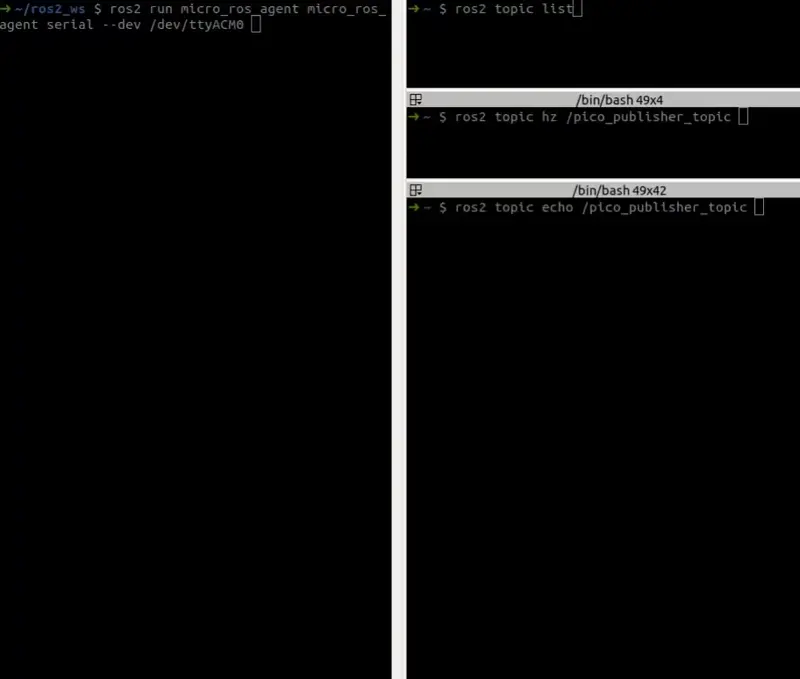Micro-ROS Raspberry Pi Pico Fixed-Rate Publisher Template
Content
- Introduction
- Prerequisites
- Publisher Node Code
- Code Review
- CMakeLists.txt
- Deployment Results
- Ten Seconds to Remember It All
- Conclusion
Introduction
In this tutorial, we will extend the previous template Micro-ROS Raspberry Pi Pico Publisher Template. Indeed, instead of publishing at the maximum possible frequency (processor frequency subject to system constraints) we will specify a publication frequency.
Prerequisites
- Pico SDK installed.
- Basic knowledge of ROS 2 and understanding of nodes and messages.
- Familiar with the Micro-ROS Raspberry Pi Pico Publisher Template
Fixed-Rate Publisher Node Code
Here is the complete code for the ROS 2 node using Micro-ROS on Raspberry Pi Pico to publish at fixed-rate a messages via custom serial communication.
#include <stdio.h>
#include "pico/stdlib.h" // Include the standard library for Raspberry Pi Pico
extern "C" {
#include <rcl/rcl.h> // Main ROS 2 client library
#include <rcl/error_handling.h> // Error handling for ROS 2
#include <rclc/rclc.h> // C library for ROS 2
#include <rclc/executor.h> // Executor for ROS 2
#include <rmw_microros/rmw_microros.h> // Middleware for micro-ROS
#include "std_msgs/msg/string.h" // Standard String message for ROS 2
#include "pico_uart_transports.h" // UART transport specific for Pico
}
#include <string> // Include the standard C++ string library
constexpr uint LED_PIN = PICO_DEFAULT_LED_PIN; // Define the LED pin number
rcl_publisher_t publisher; // Declare the ROS 2 publisher
std_msgs__msg__String publisher_msg; // Declare the ROS 2 message
bool message_send = false; // Flag for message sending
const char * publisher_topic_name = "pico_publisher_topic";
const char * node_name = "pico_node";
const int frec = 50; //publication frequency in Hz
// Define the states
enum states {
WAITING_AGENT,
AGENT_AVAILABLE,
AGENT_CONNECTED,
AGENT_DISCONNECTED
} state;
rcl_node_t node; // Declare the ROS 2 node
rcl_allocator_t allocator; // Declare the memory allocator
rclc_support_t support; // Declare the ROS 2 support
rcl_timer_t timer; // Declare the ROS 2 timer
rclc_executor_t executor; // Declare the ROS 2 executor
#define CHECK_RET(ret) if (ret != RCL_RET_OK) { rcl_reset_error(); } // Macro for silent error handling
void publisher_content(rcl_timer_t *timer, int64_t last_call_time) {
publisher_msg.data.data = const_cast<char *>("Hello World from F.Jousselin!"); // Directly assign the C string
publisher_msg.data.size = strlen(publisher_msg.data.data); // Set the size of the string
publisher_msg.data.capacity = publisher_msg.data.size + 1; // Set the capacity of the string
rcl_ret_t ret = rcl_publish(&publisher, &publisher_msg, NULL); // Publish the message
CHECK_RET(ret); // Check and handle the return value
message_send = true; // Set the flag indicating the message was sent
gpio_put(LED_PIN, 1); // Turn on the LED
}
bool pingAgent() {
const int timeout_ms = 100; // Timeout of 100ms
const uint8_t attempts = 1; // Number of attempts
rcl_ret_t ret = rmw_uros_ping_agent(timeout_ms, attempts); // Ping the micro-ROS agent
return (ret == RCL_RET_OK); // Return true if ping succeeded, false otherwise
}
void createEntities() {
allocator = rcl_get_default_allocator(); // Get the default memory allocator
rcl_ret_t ret = rclc_support_init(&support, 0, NULL, &allocator); // Initialize the support
CHECK_RET(ret); // Check and handle the return value
ret = rclc_node_init_default(&node, node_name, "", &support); // Initialize the node
CHECK_RET(ret); // Check and handle the return value
ret = rclc_publisher_init_default(
&publisher,
&node,
ROSIDL_GET_MSG_TYPE_SUPPORT(std_msgs, msg, String),
publisher_topic_name); // Initialize the publisher
CHECK_RET(ret); // Check and handle the return value
int period_ms = 1000 / frec;
rclc_timer_init_default(
&timer,
&support,
RCL_MS_TO_NS(period_ms),
publisher_content);
CHECK_RET(ret); // Check and handle the return value
const rosidl_message_type_support_t * type_support =
ROSIDL_GET_MSG_TYPE_SUPPORT(std_msgs, msg, String);
ret = rclc_executor_init(&executor, &support.context, 2, &allocator);
CHECK_RET(ret); // Check and handle the return value
ret = rclc_executor_add_timer(&executor, &timer);
CHECK_RET(ret); // Check and handle the return value
}
void destroyEntities() {
rmw_context_t * rmw_context = rcl_context_get_rmw_context(&support.context); // Get the RMW context
(void) rmw_uros_set_context_entity_destroy_session_timeout(rmw_context, 0); // Set the destruction timeout
rcl_ret_t ret;
ret = rcl_publisher_fini(&publisher, &node); // Finalize the publisher
CHECK_RET(ret); // Check and handle the return value
ret = rcl_node_fini(&node); // Finalize the node
CHECK_RET(ret); // Check and handle the return value
ret = rclc_support_fini(&support); // Finalize the support
CHECK_RET(ret); // Check and handle the return value
ret = rcl_timer_fini(&timer); // Finalize the timer
CHECK_RET(ret); // Check and handle the return value
ret = rclc_executor_fini(&executor); // Finalize the executor
CHECK_RET(ret); // Check and handle the return value
}
void handle_state_waiting_agent() {
state = pingAgent() ? AGENT_AVAILABLE : WAITING_AGENT; // If ping successful, go to AGENT_AVAILABLE, otherwise stay in WAITING_AGENT
}
void handle_state_agent_available() {
createEntities(); // Create ROS 2 entities
state = AGENT_CONNECTED; // Go to AGENT_CONNECTED state
}
void handle_state_agent_connected() {
if (pingAgent()) {
rclc_executor_spin_some(&executor, RCL_MS_TO_NS(100)); // Send content if connected
} else {
state = AGENT_DISCONNECTED; // If ping fails, go to AGENT_DISCONNECTED
}
}
void handle_state_agent_disconnected() {
destroyEntities(); // Destroy ROS 2 entities
state = WAITING_AGENT; // Return to WAITING_AGENT state
}
void state_machine() {
switch (state) {
case WAITING_AGENT:
handle_state_waiting_agent(); // Handle WAITING_AGENT state
break;
case AGENT_AVAILABLE:
handle_state_agent_available(); // Handle AGENT_AVAILABLE state
break;
case AGENT_CONNECTED:
handle_state_agent_connected(); // Handle AGENT_CONNECTED state
break;
case AGENT_DISCONNECTED:
handle_state_agent_disconnected(); // Handle AGENT_DISCONNECTED state
break;
default:
break;
}
}
int main() {
stdio_init_all(); // Initialize standard I/O
rmw_uros_set_custom_transport(
true,
NULL,
pico_serial_transport_open,
pico_serial_transport_close,
pico_serial_transport_write,
pico_serial_transport_read
); // Set the custom serial transport for micro-ROS
gpio_init(LED_PIN); // Initialize the LED pin
gpio_set_dir(LED_PIN, GPIO_OUT); // Set the LED pin direction to output
allocator = rcl_get_default_allocator(); // Get the default memory allocator
state = WAITING_AGENT; // Initialize the state to WAITING_AGENT
while (true) {
state_machine(); // Handle the state machine
if (message_send) {
message_send = false; // Reset the flag
} else {
gpio_put(LED_PIN, 0); // Turn off the LED if no new message was sent
}
}
return 0; // End of the program
}
Code Review
This code modifies and includes several essential parts of the previous template:
-
Initialization and Configuration:
Adds frequency, timer and executor declarationconst int frec = 50; //publication frequency in Hzrcl_timer_t timer; // Declare the ROS 2 timer rclc_executor_t executor; // Declare the ROS 2 executor -
Publisher Content Function:
Adds parameters to thepublisher_content()method to manage periodic publisher callsvoid publisher_content(rcl_timer_t *timer, int64_t last_call_time) -
Agent Connection State Management:
-
In the
createEntities()method are to initialise the timer and its executor:int period_ms = 1000 / frec; rclc_timer_init_default( &timer, &support, RCL_MS_TO_NS(period_ms), publisher_content); CHECK_RET(ret); // Check and handle the return value const rosidl_message_type_support_t * type_support = ROSIDL_GET_MSG_TYPE_SUPPORT(std_msgs, msg, String); ret = rclc_executor_init(&executor, &support.context, 2, &allocator); CHECK_RET(ret); // Check and handle the return value ret = rclc_executor_add_timer(&executor, &timer); CHECK_RET(ret); // Check and handle the return value -
The timer and executor are destroyed in the
destroyEntities()method:ret = rcl_timer_fini(&timer); // Finalize the timer CHECK_RET(ret); // Check and handle the return value ret = rclc_executor_fini(&executor); // Finalize the executor CHECK_RET(ret); // Check and handle the return value -
When the agent is activated in the
handle_state_agent_connected()method, the executor spin is executed:rclc_executor_spin_some(&executor, RCL_MS_TO_NS(100)); // Send content if connected
-
CMakeLists.txt
To compile this program, ensure you edit CMakeLists.txt as follows:
# Set the minimum required version of CMake for this project
cmake_minimum_required(VERSION 3.13)
# Include the CMake file to import the Raspberry Pi Pico SDK
include($ENV{PICO_SDK_PATH}/external/pico_sdk_import.cmake)
# Declare the project with its name and the languages used
project(main C CXX ASM)
set(CMAKE_C_STANDARD 11) # Set the C standard to use
set(CMAKE_CXX_STANDARD 17) # Set the C++ standard to use
# Initialize the Pico SDK
pico_sdk_init()
# Add the directory for libraries to search
link_directories(libmicroros)
# Add an executable named "main" including the specified source files
add_executable(main
publisher.cpp
pico_uart_transport/pico_uart_transport.c
)
# Link the necessary libraries to the "main" executable
target_link_libraries(main
pico_stdlib # Standard library for Pico
microros # Micro-ROS library
)
# Specify the include directories for the "main" executable
target_include_directories(main PUBLIC
libmicroros/include # Include headers for Micro-ROS
pico_uart_transport # Include headers specific to Pico UART transport
)
# Add extra outputs for the "main" executable (binary files, UF2, etc.)
pico_add_extra_outputs(main)
# Set compilation flags to optimize the binary size
SET(CMAKE_C_FLAGS "${CMAKE_C_FLAGS} -ffunction-sections -fdata-sections")
SET(CMAKE_CXX_FLAGS "${CMAKE_CXX_FLAGS} -ffunction-sections -fdata-sections")
# Enable USB output and disable UART output for standard I/O
pico_enable_stdio_usb(main 1) # Enable USB output, necessary for using picotool for loading
pico_enable_stdio_uart(main 0) # Disable UART output
# Add compilation definitions to configure carriage return and line feed (CRLF) support
add_compile_definitions(PICO_UART_ENABLE_CRLF_SUPPORT=0) # Disable CRLF support for UART
add_compile_definitions(PICO_STDIO_ENABLE_CRLF_SUPPORT=0) # Disable CRLF support for stdio
add_compile_definitions(PICO_STDIO_DEFAULT_CRLF=0) # Set the default CRLF conversion to 0 (no conversion)
# Add extra outputs again to ensure all configurations are accounted for
pico_add_extra_outputs(main)
Deployment Results

Ten Seconds to Remember It All
The aim of this section is to provide a quick overview of the critical parts involved in publishing messages.
In this code a few lines have been added and modified from the Micro-ROS Raspberry Pi Pico Publisher Template to integrate a fixed-rate publication and the modified lines are identified in the Code Review section.
This publisher uses a reliable Quality of Service (QoS) setting that prioritizes guaranteeing message reception over maximizing the number of sent messages. To use a best-effort QoS, replace rclc_publisher_init_default with rclc_publisher_init_best_effort in the createEntities() method.
Conclusion
In this tutorial, we explored how to extend the Micro-ROS Raspberry Pi Pico Publisher Template to publish at fixed-rate.
You can expand this project by adding more complex behaviours, exploring different message types, or integrating more deeply with existing ROS 2 components in your robotic network by following one of my other templates. Enjoy exploring ROS 2 on embedded platforms!
All the codes provided in this template are distributed under the BSD 3-Clause licence.
 Micro-ROS
Micro-ROS  ROS
ROS  NAV2: MPPI Parameters Tuning
NAV2: MPPI Parameters Tuning